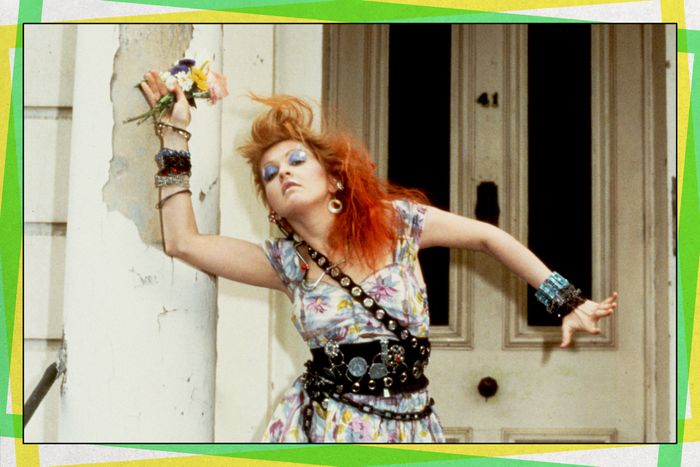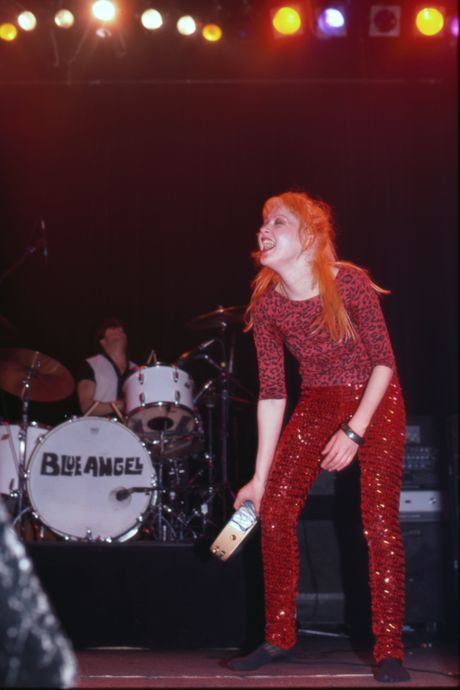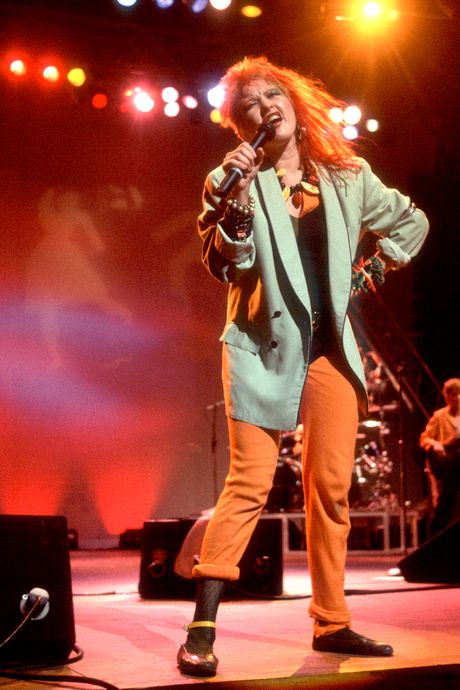
Across four decades, Cyndi Lauper has excelled at dancing a different path than most of her peers. The singer is one of the many fairy godmothers of inclusive pop music, and her songs read like love letters to her family and community. “It wasn’t a fake thing,” she recalls. “That’s all I wanted to do. I wanted to contribute.” Early hits “Girls Just Want to Have Fun” and “She Bop,” off her confetti canon of a debut, She’s So Unusual, quickly became anthems for young feminists and were complemented by the more reflective “Time After Time” and “All Through the Night.”
Today, Lauper’s big voice and even bigger heart are still going strong as she embarks on her Girls Just Wanna Have Fun farewell tour — which, she stresses, is really the last hurrah. “I’ve come a long way on the stage,” she says. “When I was younger, I had a garbage bin for performances.” Lauper has long visualized this moment as an appropriate punctuation mark for her career, and — as she once prophesied — the 71-year-old intends to go out with a lion’s roar. “No matter what your path is, even if somebody didn’t carve it out in front of me, I was going to go through it to see the other side and become the artist I had hoped to be,” she says. “Singers are important in the world. I fucking sing because the world needs it.”
Most enduring lesson


I began in a cover band called Doc West. We had a manager who used to tell me, “You have to do Janis Joplin stuff.” He would also tell me to take all my makeup off because Joplin didn’t wear makeup. As a young woman, I was embarrassed to stand onstage with no makeup. The whole idea of having a guy telling you what to do — and a drummer who needed you to talk to an audience while he was changing his drum head — was a challenge. So by the time I got through with the cover bands, I had learned how to perform. My first gig was in front of what seemed like 10,000 people at the Boardy Barn in the Hamptons. The big complaint was that I moved like a boy. “What the hell was wrong with me? Why couldn’t I be still and sing?” I tried really hard. I once found myself with one leg on the floor and one leg on the stage. And I was like, What the heck am I doing? When I lost my voice they would say stupid things like, “Hey, Joplin used to drink this, Jack Daniels.” I kept thinking, Yeah, why should I drink this? So you can kill me too?
So by the time I met John Turi, I was really excited to learn. I was imitating people but didn’t sound like them. I wanted to become a better singer and understand phrasing. I didn’t like the sound of my voice, so I went to jazz school for a while. Of course, they threw me out because they wanted me to choose between jazz and my rock band. As crappy as it could be on certain nights with people walking through your setup with a large pizza, I didn’t want to give up singing rock and roll. So I quit school. But I did learn a lot. I learned to stand in the center of the rhythm. I listened to Billie Holiday — I sang with her breath for breath, note for note. It enabled me to understand not being fearful of the snare.
But what John taught me was invaluable to my whole career: Take a song and go through the different keys to hear what my voice did in each key. Then all of a sudden you hear a story that you could tell. You now have something that’s relatable to yourself, and once it’s relatable to yourself, it’s also relatable to other human beings. Somebody’s going to listen and go, “Oh man, I felt like that.” When I sing, I want to be free. I want to connect to the music, to the sound, to the sky, and to the earth. I want to be the conduit.
Album that scared people the most
She’s So Unusual shocked and scared everybody. They looked at me and were like, What the heck? I was an art major, so I got a makeup artist. I said, “Can you paint me?” We started painting my face. It was like war paint. That’s how we did the makeup. It was something I developed for love of color and love of vintage. Then I wanted to do wilder things, and people would say, “Oh, that’s just strange.” That just made me want to do it more. Let’s go after it. Let’s do this.
Biggest transitional moment
I had a hard time when I was famous after She’s So Unusual came out. I used to walk, listen, sit, write, and walk some more. But once I became famous and tried walking alone, people would follow me. One time, a car stopped right in front of me, and all these people popped out of the car. Luckily, they just wanted autographs, but this type of thing scared the hell out of me. I found myself taking off all the things that I collected and loved and hiding them. I had all these feelings that were exploding in color, and all of a sudden it was like, Suck it back in, bitch, you can’t go anywhere.
Also, when I first hit, people took everything I was wearing — the color, the style, you name it — then spit it out and were onto the next. I remember seeing a documentary on Steve Martin, and I was reminded how he worked a long time on a different kind of humor. He went on Saturday Night Live, and everything he did people would do back to him. But all of a sudden the culture sucked him up, spit him out, and went on to the next person. That’s how I felt.
Most hard-fought song
When I was still on Polydor with my first group, Blue Angel, they wanted to cover “I’m Gonna Be Strong” but put a choral arrangement on it. And I said, “Oh, hell no. I don’t sing like that and I’m not doing that.” What was special about “I’m Gonna Be Strong” was the intimacy. Once you start piling all the crap on, there’s no intimacy anymore. It’s just a lot of crap. Do you remember Whitney Houston singing “I Will Always Love You” in the beginning with nothing, and it pulled your heart right out of your chest? If you put a lot of shit on top of that, you would never feel that. That’s why I fought. Not because of Whitney Houston — that song of hers came way after mine — but to have authenticity and to make modern music.
And my God, our songs were catchy. Putting on little catchy hooks made them better. They sounded like summer and happy things. Then everybody started to open up in Blue Angel and we became a really wonderful little band together. Every time they went hard rock again, I would pull them out of that and fight. They didn’t understand what I was fighting about. But I wanted it to be modern. I wanted to make new music because everything that was coming over from England was fantastic. I would rather have aligned myself with that sound because it was inspiring to me.
By the time I made She’s So Unusual, it was all men in the studio, but I elbowed my way in. They didn’t think it was going to be commercial. Blah, blah, blah. But I still wanted to write. The main thing I had to fight about was writing the last song, “Time After Time.” When I started writing with Rob Hyman, it felt different. We were able to write “Time After Time” pretty quickly. I was on the phone with him writing the words and there still wasn’t a chorus. I remember sitting there in my little studio apartment and thinking to myself, I’m going to write this and I hope it becomes so big that they remember to give people a chance to do what they do. Then I felt a hand on my shoulder. There was nobody there, but it calmed me down. Then I just started writing, “If you fall, I will catch you, I’ll be waiting, time after time.” A little spooky, right? I got the title “Time After Time” from the TV Guide. There was a movie airing called Time After Time. I looked up how many song titles were “Time After Time” and there were tons. Frank Sinatra already had a song called that, so I figured, Okay, we can’t use the title. But every time I tried to take it out, the whole thing fell apart. So I left it in and I had a conversation with Rob and everything he was going through. I wrote down every single thing he said and the things that I saw. One thing was Rick Chertoff standing in the studio and going, “My watch is doing crazy things and going backwards. Look, the second hand’s unwinding here.” I thought, What a great line. I wrote it down for “Time After Time” and he had no idea.
The truth is, with all the gatekeepers — and there’s tons of them, even now, in every place — you have to take a step back and know there’s always a way around them. You don’t have to jump in the baddest shit and fight them all the time. There’s just always a way to get around gatekeepers. You’ve got to find allies who are like singers. Then you can do what it is you want to do.
Proudest provocateur moment
When I got my mother to do the music video for “Girls Just Want to Have Fun.” I told her, “Look, Ma, we can make a difference if you’re in it.” Because in the beginning of the ’80s, it was becoming a thing where you didn’t get along with your mother. But to not understand the history of your mom and your grandmother is huge. If you don’t know where you came from, you make similar mistakes over and over. When I would do concerts when I was getting bigger and bigger, I remember looking out and seeing grandmothers with their daughters and granddaughters. The grandmothers had all sorts of rhinestones on and the daughters spray-painted the side of their heads. And their children, well, they were scary versions of me. For the first time, I felt like I did something good. I brought three generations of women together. For me, that meant everything in the world.
Most courageous song
I took the brunt of it with “True Colors” at first. I talked about AIDS, which wasn’t very popular to openly discuss. But around 1997, I started to read emails — it was fascinating that I could answer back and forth like that, to somebody someplace far away; it was like being Captain Kirk in Star Trek — from people who were suffering. I knew “True Colors” was a healing song. I didn’t fully realize how it was embraced by the LGBTQ community. Of course, I sang it for my friend who had died from AIDS and for his survivors and his friends who were there without him. But in emails, I started to read the same story over and over: how people had been disenfranchised by their families, friends, and workplaces and felt suicidal. Then they heard the song and decided they could live. I thought, Oh my God. So I called my sister, who’s in the LGBTQ community and an activist, and said, “When the time is right, we have to do something here.” That’s how that journey started with True Colors United. I think I’ve been fortunate enough to contribute what I can to the world.
How you envision getting the ‘O’ in ‘EGOT’
I do love to write for independent projects. It’s a pleasure. You get to talk to the directors and they’re usually very quirky. They tell you what they want, what they’re thinking, and then you try to go into their head and get what they actually want. I’ve been known to scare a few people at that sort of thing. I think Kinky Boots, as a musical, might become a movie. I’m now working on Working Girl. I’ve been focused on this for so long — it’s the musical adaptation of the film. It’s going to be at the La Jolla Playhouse in the fall of 2025 and then it’s hopefully coming to Broadway in 2026.
But I’m focused on what’s going on in the world and what young women should be hearing. This musical has to be in the ’80s, because these young girls now didn’t even know what was really going on in the ‘80s, okay? You heard these girls running their mouths at the time, I’m not really a feminist. I’m like, Really? Did you go to college? Do you belong to a health club? Are you able to walk into a bar and buy a drink? Do you have a credit card? All of that shit is what feminism is. Vote feminist. When you don’t vote, you’re hurting yourself.
So I want to inspire young girls in a very happy and joyful way, in the same way I did in the beginning of my career. Each little girl was able to see herself because we were integrated and we were a quilt. We were like New York. This city has everybody. It’s a miracle for me that I was born here.
More From The Superlative Series
- Hans Zimmer on His Most Unusual and Underrated Scores
- The Coolest and Craziest of TLC, According to Chilli
- Kim Deal on Her Coolest and Most Vulnerable Music
Lauper’s “T”: Best Original Score (Kinky Boots, 2013).
Lauper’s “G”: Best New Artist (1985) and Best Musical Theater Album (Kinky Boots, Broadway Cast, 2014).


